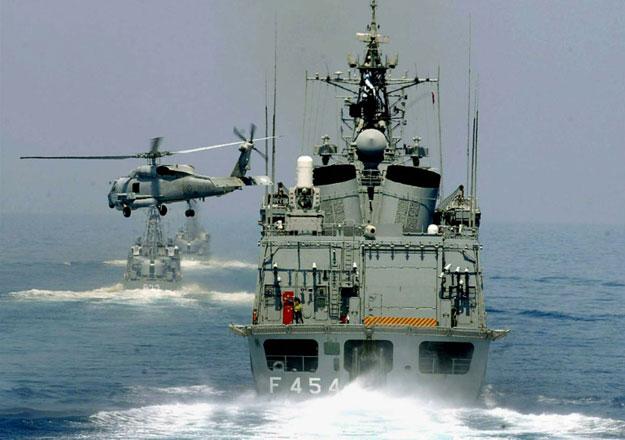- International News
- Thu-2020-07-23 | 05:52 pm

The move came after the Greek foreign ministry on Tuesday formally protested to Ankara following the announcement that a Turkish drilling ship would conduct explorations in the area south of the Greek island of Kastellorizo in the southeastern Aegean.
"Navy units have been deployed since yesterday in the south and southeastern Aegean", the source told AFP, declining to give further detail.
The units "are ready to respond to any activity", the officer said.
The Greek navy also called on seafarers to ignore a maritime restriction in the area issued by Turkey.
Prime Minister Kyriakos Mitsotakis has called separate meetings with Greek party leaders on Thursday and Friday to brief them on "national issues," his office said.
Athens had said Turkish surveys in a section of the Greek continental shelf escalate tensions in a region where Turkey disputes Greek maritime rights.
"We call on Turkey to immediately cease its illegal activities, which violate our sovereign rights and undermine peace and security in the region," the Greek foreign ministry said.
Meanwhile, Germany said that relations with Turkey could improve if Ankara halts "provocations", referring to what the EU considers illegal Turkish oil drilling in the Mediterranean.
"Regarding Turkey's drilling in the eastern Mediterranean, we have a very clear position — international law must be respected, so progress in EU-Turkey relations is only possible if Ankara stops provocations in the eastern Mediterranean", German Foreign Minister Heiko Maas said during a visit to Athens.
Turkish drilling off Cyprus must stop, he said.
The EU is unhappy at what it says is Turkey’s illegal drilling for oil and gas off the coast of Cyprus, as well as Ankara’s actions in support of the UN-recognised government in Libya and accusations the Turkish government is eroding rights and democracy at home.
Egypt’s parliament on Monday greenlighted a possible deployment of troops beyond its borders, to counter potential military operations in neighbouring Libya, a move which Maas said could "escalate” matters.
There is also concern at the direction Turkey — still nominally a candidate to join the EU — has taken under President Recep Tayyip Erdogan, with the decision to turn Istanbul’s iconic Hagia Sophia back into a mosque the latest source of contention.
EU diplomatic chief Josep Borrell, who travelled to Ankara for talks with Turkish ministers last week, has stressed the need to defuse tensions through dialogue.
Maas on Tuesday also insisted on the "importance” of keeping dialogue channels open with Turkey, a "strategically important” country on NATO and migration issues.
Germany, which took over the rotating six-month European Council presidency on July 1, is also placing migration high on its agenda.
"We want a common European answer on the migration issue,” the German minister said.
Turkey, which hosts nearly four million Syrian refugees on its soil, accuses the EU of not honouring all its commitments under a controversial 2016 agreement to combat people smuggling in return for financial assistance.
Erdogan announced in February the opening of the border with Greece, causing a surge of tens of thousands of refugees at the frontier.













